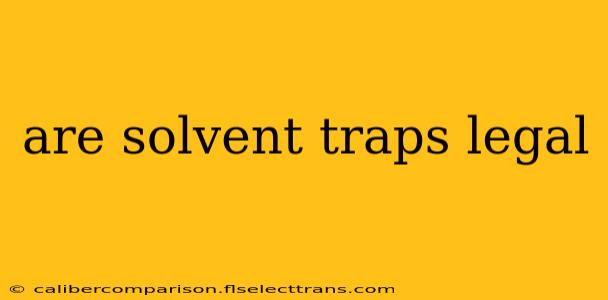The legality of solvent traps is a complex and highly debated issue in the United States, varying significantly by state and often depending on interpretation of existing laws rather than specific statutes addressing them directly. This guide aims to provide a comprehensive overview, clarifying the uncertainties and highlighting the crucial factors influencing their legal status.
What is a Solvent Trap?
Before delving into the legal complexities, it's crucial to understand what a solvent trap is. A solvent trap is a device that resembles a firearm silencer or suppressor. However, its purported primary function isn't sound suppression; it's designed to trap solvents and other particulate matter during cleaning. This design similarity is at the heart of the legal debate.
The Legal Gray Area: NFA and ATF Interpretations
The primary legal hurdle for solvent traps stems from the National Firearms Act (NFA) of 1934. The NFA regulates certain firearm accessories, including silencers, which require registration with the Bureau of Alcohol, Tobacco, Firearms and Explosives (ATF). The ATF's interpretation of the NFA is central to whether a solvent trap is considered a regulated firearm accessory.
The ATF has issued rulings classifying some solvent traps as unregistered silencers, leading to legal challenges and enforcement actions. Their determination often hinges on whether the device is readily convertible into a functional silencer. This means even if the device's intended purpose is solvent trapping, its design and components might allow for easy modification to suppress the sound of a firearm.
Factors Affecting ATF Classification:
- Design Features: The physical attributes of the solvent trap are critically examined. Features that facilitate easy conversion to a silencer, like readily available parts or adaptable threading, increase the likelihood of ATF classification as a regulated item.
- Intended Use: While the manufacturer's claims regarding intended use are considered, the ATF will focus on the device's capabilities and potential for misuse. This means marketing a device as a "solvent trap" doesn't guarantee it won't be considered a silencer under the law.
- ATF Guidance: The ATF releases periodic guidance documents, updates, and rulings clarifying their interpretation of NFA regulations. Staying informed about these updates is critical to understanding the current legal landscape.
State-Specific Laws: A Patchwork of Regulations
Complicating matters further, state laws regarding firearms and accessories also play a crucial role. While federal law provides the baseline, individual states might have stricter regulations on silencers, firearm parts, or even devices resembling firearms. This creates a complex regulatory environment where a solvent trap might be legal in one state but illegal in another.
Potential Penalties for Illegal Possession
Possession of an unregistered NFA item, such as a solvent trap classified as a silencer, can result in significant penalties, including:
- Fines: Substantial financial penalties are possible.
- Imprisonment: Jail time is a potential consequence of violating NFA regulations.
- Forfeiture: The device, and potentially other related items, could be confiscated.
Staying Informed and Minimizing Risk
Given the ambiguous legal status of solvent traps, it's crucial to:
- Stay updated on ATF rulings and state laws: Regularly consult official ATF websites and relevant state legislation for the most current information.
- Consult with legal counsel: If you intend to purchase or possess a solvent trap, seeking legal advice from a knowledgeable attorney specializing in firearms law is strongly recommended.
- Understand the risks: Be aware that even if a solvent trap is marketed as legal, there's always a risk of ATF scrutiny and potential legal consequences.
Disclaimer: This information is for educational purposes only and does not constitute legal advice. The legality of solvent traps is a complex and ever-evolving area of law. Always consult with an attorney specializing in firearms law before purchasing or possessing any device that might be subject to NFA regulations. This article provides general information and should not be interpreted as a definitive statement on the legality of solvent traps in any specific jurisdiction.

